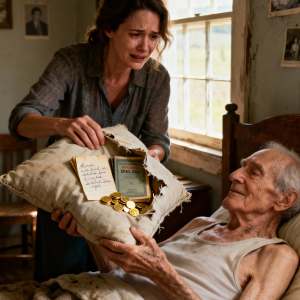
I should have recognized the warning signs. They were there, fine cracks beneath the glossy surface of our life together, like flaws in porcelain too small for guests to notice. For nearly forty-five years, I had been married to Bernard, a man who regarded himself as master of our household, while I, Margaret, had long ago learned the art of keeping peace by keeping quiet.
That evening looked, at first glance, like so many others. I spent hours tending the roast in the oven, basting it with care, setting the table with the porcelain I had chosen as a hopeful young bride. Back then, I’d imagined candlelit dinners and lively conversation. Instead, those dreams had been slowly strangled by Bernard’s grumbling discontent and the endless bottles of beer that kept him company.
Our daughter-in-law, Annelise, arrived on the dot of six, sweeping through the front door without knocking, as if our home were hers by right. She had married my son, Daniel, over a decade ago, and from the start, she treated me like a relic—present, but unnecessary.
“Margaret, you really didn’t have to go to this much trouble,” she said, her eyes skating across the table with a glance that carried more criticism than thanks. “Takeout would’ve been fine.”
Her daughter, fifteen-year-old Sophia, muttered a distracted “hi,” her gaze glued to her glowing phone screen. Once upon a time she had clung to me with sticky fingers and laughter; now, she hardly looked up, as if acknowledging me cost too much effort.
Bernard sat in his place at the head of the table, condensation dripping from his second beer onto the polished wood. He’d never used coasters, though I’d begged him to for years. It was easier to stop asking than to listen to him mock my fussing.
Dinner, as always, turned into a performance where my role was silence. Annelise filled the air with stories of her job promotion, the renovation plans for her kitchen, Sophia’s private school. Bernard chimed in with his familiar refrain: the roast was too dry, the house too drafty, the meal too fussy. Each comment was a tiny slice, insignificant in isolation but exhausting in their accumulation.
“Mother always puts in so much effort,” Annelise said with a laugh that disguised cruelty as kindness. “It’s so… quaint.”
Quaint. That was her word for me, her dismissal neatly wrapped in politeness.
Sophia giggled at something on her phone, showed it to her mother, and the two burst out laughing. Bernard joined in, chuckling loudly even though he didn’t know the joke. He simply wanted to be part of their circle, and by definition, that meant I was on the outside.
I made the mistake of trying to join. “What’s so funny?” I asked, the question sincere.
Bernard turned toward me, his expression heavy with irritation. “Margaret, you wouldn’t understand. It’s a generational thing.”
“Some humor doesn’t translate,” Annelise added, with a smile designed to sting.
I should have let it go. But something inside me—forty-five years of being overlooked, belittled, erased—made me press on. “Try me. Perhaps you’ll be surprised.”
Bernard’s hand tightened around his wine glass. He raised it, his face flushed with drink and annoyance. “You want to know what’s funny? That you still pretend you have anything worth saying.”
And with that, he tipped the glass.
The wine hit me like ice. It soaked my hair, streaked down my cheeks, seeped into the blouse I had chosen with care. For a heartbeat, the table was silent. Then came Annelise’s laughter, shrill and delighted, followed by Sophia’s giggles and Bernard’s rumbling amusement.

I sat motionless, the liquid dripping onto my lap, and felt seventy-three years settle on me all at once. Quietly, I dabbed my face with my napkin, folded it neatly, and placed it by my plate. Without a word, I rose and went to the closet for my coat and handbag.
“Margaret, you should see your face!” Annelise called, choking on laughter.
I didn’t answer. I stepped outside into the cool air, walked past the roses I had planted decades ago, and left.
It wasn’t until I was sitting in the car park of a small grocery store that my phone rang. Bernard’s voice was urgent, stripped of its swagger. “You need to come back. Now. There are three lawyers here, asking about the house. They’re saying it’s in your name. Impossible!”
I listened, stunned. My parents had died when I was very young, leaving me a small inheritance. I had signed the papers Bernard placed in front of me back in 1980. He handled everything—or so I thought.
When I returned, the men in suits explained: the property had been bought entirely with my inheritance. My parents’ will had contained ironclad instructions that anything purchased with those funds be solely mine. Bernard, for all his years of mortgage payments, had merely been a tenant. The house had been fully paid off in 1987; every check since had been funneled into a protected account that now held nearly half a million dollars.
I stared at the documents in silence, while Bernard’s face turned pale.

One of the lawyers produced a yellowed envelope addressed to me. “Your parents included a clause,” he explained softly. “If ever you were disrespected in your own home, you could claim exclusive possession immediately.”
Bernard scoffed, desperate. “Disrespected? Don’t be ridiculous.”
I remembered the laughter as wine dripped from my hair. I looked straight at the lawyer. “Tell me how to invoke it.”
Sixteen days later, Bernard and Annelise were gone. Their threats and pleas had changed nothing. The house, for the first time in my life, was mine in more than name.
I repainted the walls, filled the shelves with the novels I loved, and enrolled in online courses I had long dreamed of. At seventy-three, I was no longer just a wife, a mother, a grandmother.
I was Margaret Sinclair. And for the first time, I was free.




